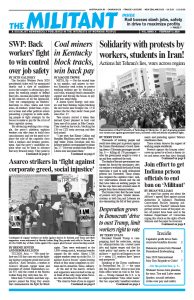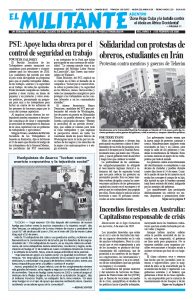February 6, 1995
PARKES AND MUDGEE, Australia — Hundreds of family farmers and supporters across drought-stricken south and central parts of this state lined major country roads January 11 to publicize their demands for an extension of assistance payments and relief from recent government-imposed interest rate hikes. The farmers set up roadside “information stops” to explain their demands.
Called “Operation Dust Storm,” the actions were organized by activists in the New South Wales Farmers’ Association and the Rural Action Movement.
Although 98 percent of the state is officially “drought declared,” only 6.5 percent of the state’s farmers qualify for even the basic aid promised by Canberra. To be eligible, farms have to suffer under drought conditions for 24 out of 36 months.
February 6, 1970
YELLOW SPRINGS, Ohio — The Student Mobilization Committee at Antioch College has launched a petition campaign to force the college to boycott GE products in conjunction with the GE strike. More than 300 out of some 1,100 students have already signed.
Support for the strike became an important issue on campus after GE’s Evandale plant asked for student help in maintaining picket lines. The request came as a result of an injunction restraining striking GE workers from picketing plant gates in the morning hours when most of the non-union white-collar employees come to work.
At a mass meeting on the Antioch campus Jan. 18, more than 100 students expressed a willingness to picket. However, picketing was called off at the request of union officials pending decision on the constitutionality of the injunction.
February 3, 1945
The International Executive Board of the CIO United Automobile Workers adopted a resolution calling on the CIO to withdraw its support from Roosevelt’s War Labor Board.
In its three years of existence the WLB has earned among workers the title of “Graveyard of Grievances.” Major wage cases have been stalled as much as two years. The steel wage case was “settled” with major wage demands denied.
The hostility to the WLB is expressed most sharply in the autoworkers union, where opposition to compulsory arbitration and the no-strike surrender policy have forced the holding of a national referendum on the no-strike pledge.
Today, almost every worker recognizes that the WLB was designed to shackle the workers to compulsory arbitration, impose the wage-freeze, curb independent militant labor action.

